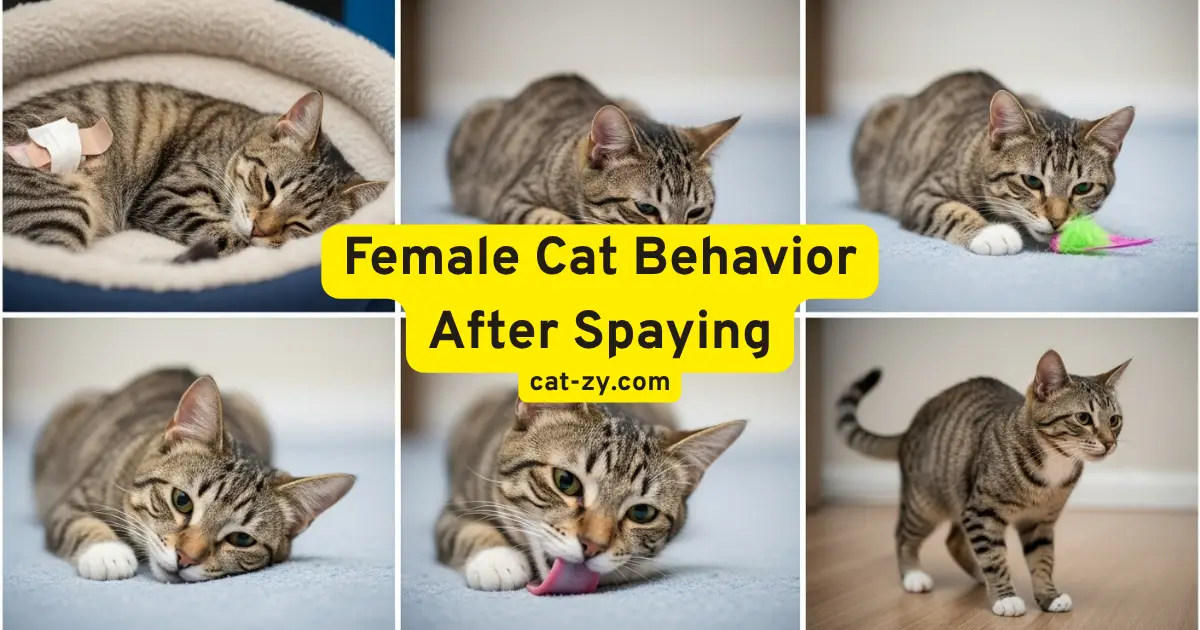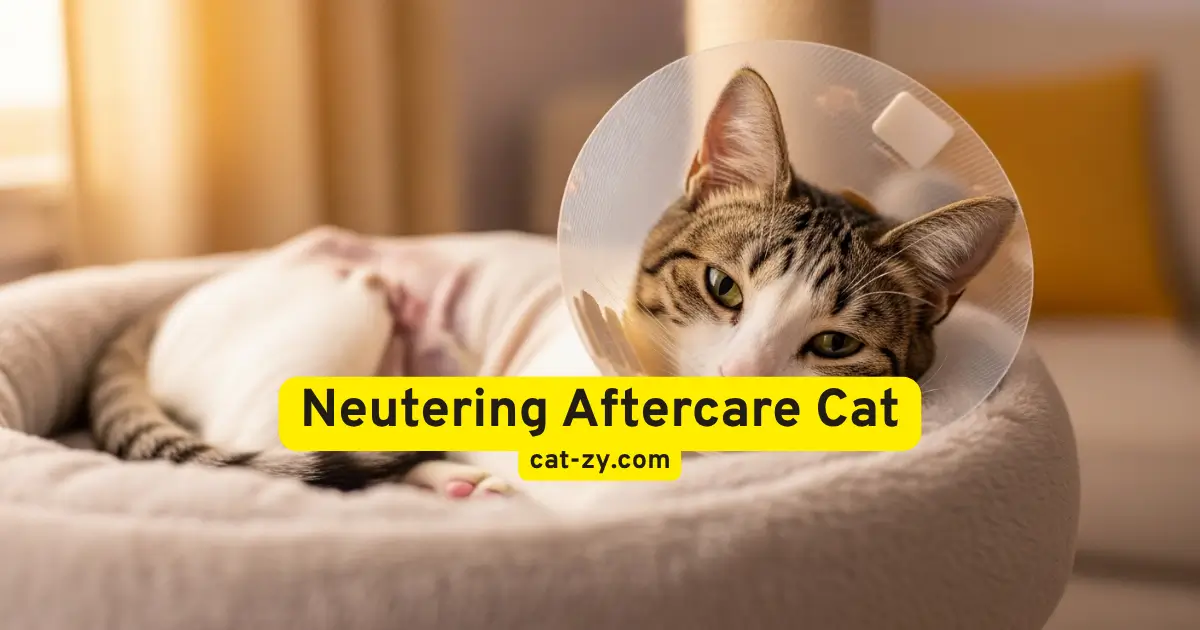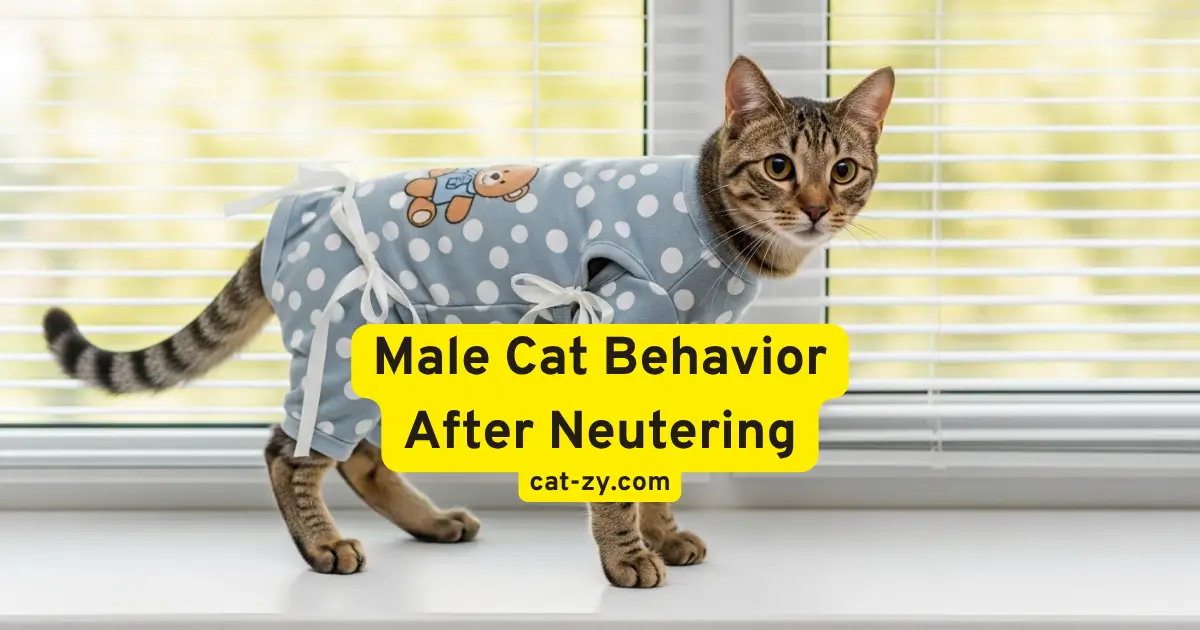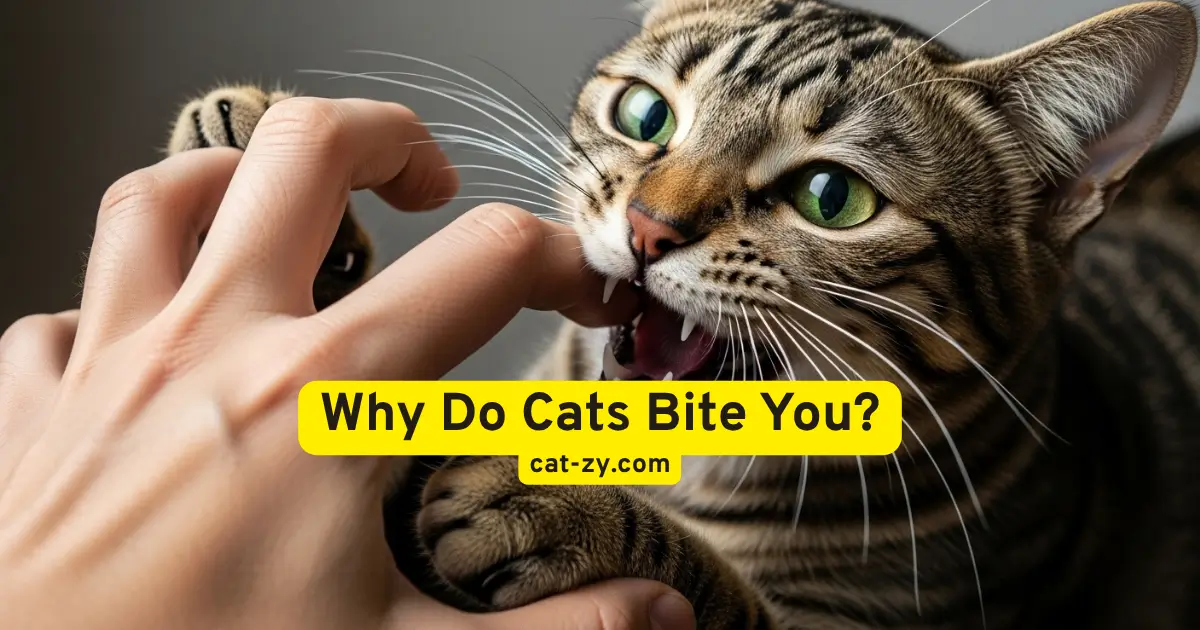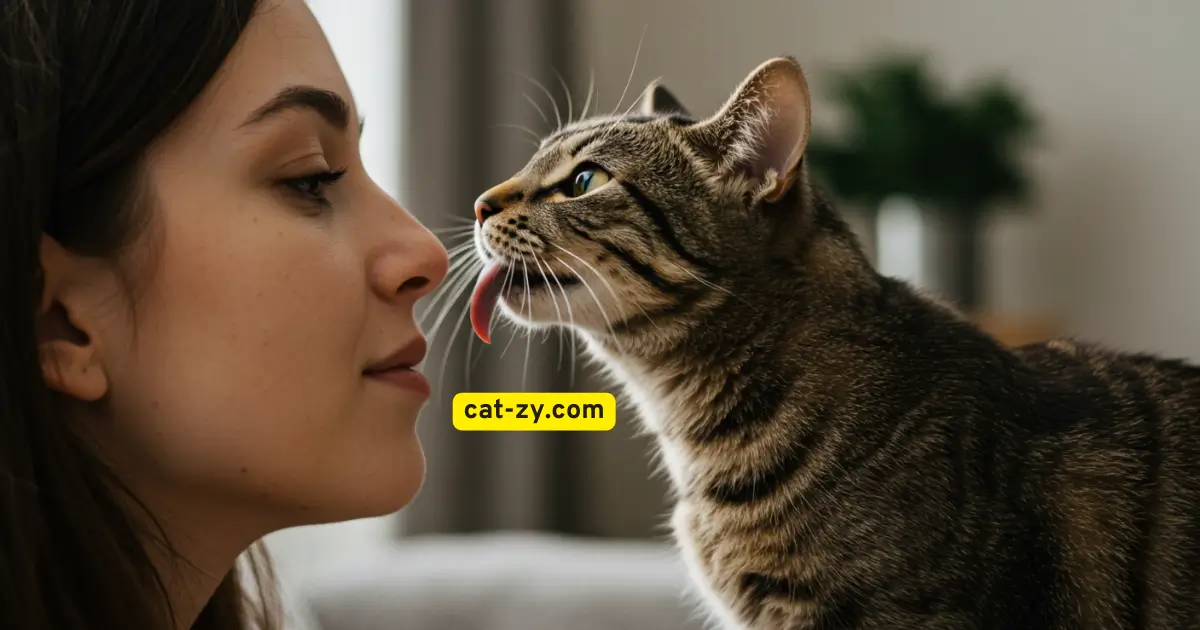7 Sweet Reasons Why Do Cats Lick You and What It Means
Ever thought about “why do cats lick you” so persistently? Those affectionate licks mean so much more than just a funny habit. They show your cat deeply cares and trusts you, just like a mom cat with her kittens, expressing love and comfort
Learning about feline grooming habits can make your bond stronger. In this article, we’ll dive into the seven sweet reasons for this behavior. This guide will assist you in comprehending your cat’s emotions and enhancing your connection.
Table of Contents
Understanding Your Cat’s Affectionate Behavior
To understand your cat’s affection, you need to know how they communicate. Cats talk in many ways, like with sounds, body language, and touch.
The Language of Feline Communication
Cats have their way of talking. They meow and purr to show how they feel. Body language is also key, showing their mood through posture and facial expressions.
Physical Expressions of Cat Emotions
Cats show their feelings through physical actions. Licking, kneading, and rubbing are important signs. Licking can mean affection, comfort, or even anxiety. Knowing these signs helps you understand and respond to your cat better.
The Evolutionary Background of Cat Licking
To understand “why do cats lick you“, we must look at their past. Their licking behavior comes from their wild ancestors. These habits helped them survive and bond with each other.
Feral felines engaged in grooming rituals to maintain cleanliness, combat pests, and establish social connections within their community. These actions were vital for their survival. They passed these habits down through generations.
Wild Cat Grooming Behaviors
In the wild, cats groom themselves and others to stay clean and bond. This wasn’t just about being clean. It was also a way to show love and set a social order.
Domestication and Retained Instincts
When cats were domesticated, they kept many of their wild instincts. Your cat might lick you as a way to groom you. They see you as part of their family or group. This feline grooming habit shows love and pet bonding between you and your cat.
This background explains “why do cats lick you“. It shows the deep cat behavior shaped by their wild ancestors.
Why Do Cats Lick You? 7 Common Reasons
Cats licking you is more than a simple act. It’s a complex behavior tied to their emotional and social needs. They lick for reasons like showing affection and marking territory. Knowing “why do cats lick you” can help you understand your cat better and strengthen your bond.
Overview of Licking Motivations
Cats lick their owners for many reasons, including showing affection, marking territory, and seeking attention. This act is often a sign of comfort and trust. By licking, cats may also be trying to groom their human family members as they would another cat, showing a deep bond.
The reasons behind a cat’s licking can vary. For example, cats may lick to taste something interesting on your skin or to self-soothe when feeling anxious or stressed. Knowing the context of their licking can help you understand their behavior better.
The Science Behind Cat Saliva
Cat saliva is key to their grooming and social behaviors. It has enzymes that clean their coats and reduce the presence of parasites. When cats lick their owners, they extend this grooming, showing affection and trust. Their saliva also carries the owner’s scent, helping in marking territory and creating comfort.
Understanding “why do cats lick you“ and the science behind their saliva can deepen your appreciation for their behavior. It helps you respond to their needs in a more meaningful way.
Reason 1: Showing Affection and Love
Cats show love in many ways, but licking their owners is one of the sweetest. This act is a big part of feline interaction patterns. It’s seen as a sign of affection.
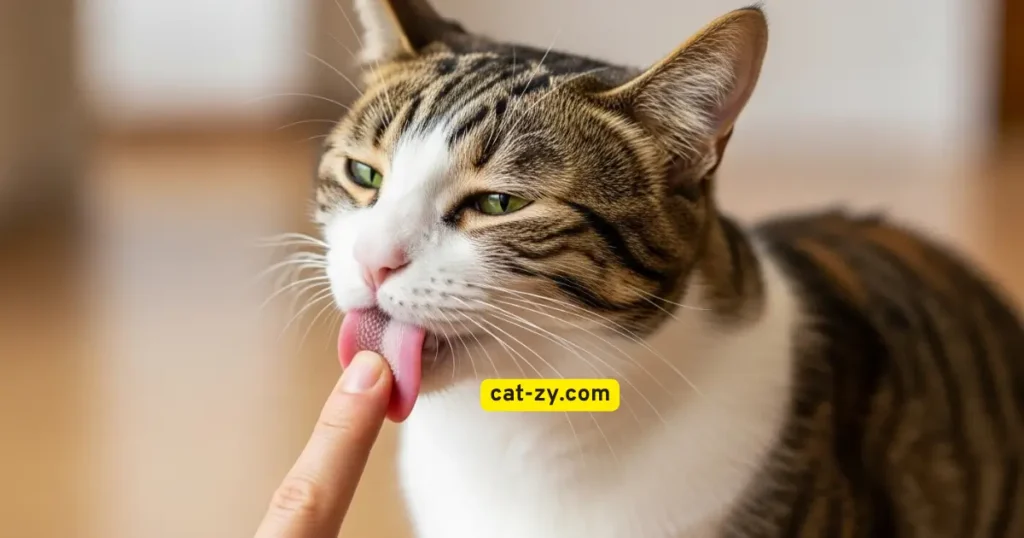
The Feline Version of Kisses
Cats lick their owners as a form of affection, like kissing. This gentle grooming behavior shows they feel safe and comfortable with you.
How Cats Express Bonding Through Grooming
Grooming is key in pet bonding. When cats groom their owners, it means they see you as family.
Distinguishing Affectionate Licks from Other Types
Not all licks are the same. Affectionate licks are gentle and often come with purring or kneading. Knowing these kitty affection signs can strengthen your bond with your cat.
Reason 2: Marking You as Their Territory
Your cat’s licking behavior extends beyond simple displays of fondness. It’s a leftover from their wild ancestors. These cats employed scent-based marking methods to establish territorial boundaries and create feelings of safety.
Scent Marking Through Saliva
Cats have scent glands in their tongues. Through licking, cats transfer their unique scent markers onto your skin surface. This scent marking shows that you belong to them.
Creating a Familiar Group Scent
In homes with multiple cats, they often lick each other. This creates a familiar group scent. By licking you, your cat might be trying to include you in their family.
Other Territorial Behaviors in Cats
Cats also scratch, urine mark, and rub their faces on surfaces. These actions help them mark their territory. They want to keep their space separate from the outside world.
Reason 3: Grooming You as Part of Their Family
Cats often groom their human family members, showing deep trust and belonging. This behavior comes from their social nature and is key to feline grooming habits.
Social Grooming in Cat Communities
In homes with multiple cats, grooming helps them bond. They lick each other to show love, reduce stress, and share a scent. This is vital for pet bonding among cats.
The Honor of Being in Their Grooming Circle
When your cat grooms you, it means they see you as family. This special bond is built on trust and love. Being part of their grooming circle shows they feel safe and comfortable with you.
Mutual Grooming Between Cats and Humans
While cats may not groom humans like they do each other, some enjoy being stroked or petted. This can make your bond with them stronger. It shows the licking behavior in cats and deepens your connection.
Understanding this part of cat behavior can make your relationship with your cat even stronger. It highlights the importance of their grooming behavior towards you.
Reason 4: Seeking Attention or Playtime
Understanding “why do cats lick you“ often reveals they’re saying, ‘Hey, notice me! They want to play or get your attention. This shows how cats communicate with us, making us understand their needs better.
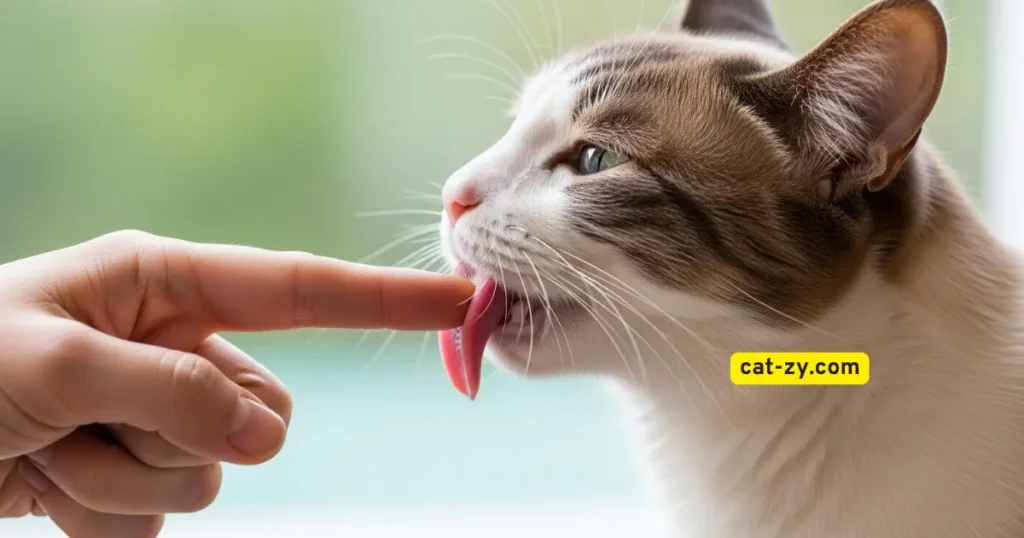
Licking as a Communication Tool
Cats use licking to talk to us in many ways. It can mean they want love or playtime. This behavior is part of their natural way of interacting, showing affection and asking for attention.
When Licking Leads to Other Interactions
Licking often leads to more interaction with your cat. It might start a game, a cuddle session, or just a chat. Knowing this helps you connect with your cat better and meet their needs.
Responding to Attention-Seeking Licks
If your cat licks you a lot, they’re probably looking for a reaction. Playing with them or showing affection can strengthen your bond. It also helps keep their behavior balanced and happy.
Reason 5: Tasting Something Interesting on Your Skin
Cats often lick their owners out of curiosity. They want to taste and smell human skin. This is because their senses of taste and smell are very sharp.
Cats’ Sensitive Taste Receptors
Cats can taste many flavors on human skin. Their taste buds can pick up on salty, sweet, sour, and bitter tastes. This makes them very sensitive to what they find.
Common Scents and Tastes That Attract Cats
Many scents and tastes draw cats to lick their owners. This includes food residue, lotions, perfumes, and natural oils from human skin. Cats find these interesting.
Products and Foods That May Trigger Licking
Some products and foods can make cats want to lick. Cooking with strong-smelling foods like fish can attract them. So can scented lotions or creams. Foods high in salt or sugar also leave tasty residues on your skin.
Recognizing the factors that draw your cat’s interest provides insight into their behavioral patterns. You can then decide if you want to encourage or discourage licking. This depends on what you prefer.
Reason 6: Anxiety or Stress Relief
Cats may lick as a way to cope with anxiety. They do this when they feel stressed or uneasy.
Self-Soothing Behaviors in Cats
Cats lick to calm themselves down. This helps them feel less stressed. It’s part of their natural grooming, which also brings them comfort and relaxation.
When Licking Becomes Excessive
Some licking is okay, but excessive licking might mean your cat is stressed. Watch for changes in your cat’s behavior to spot any issues.
Creating a Stress-Free Environment for Your Cat
To reduce your cat’s stress, make their space calm and comfy. Give them a quiet area, keep a routine, and offer hiding spots and places to climb.
Reason 7: Maternal Instincts Toward You
Some cats show a special behavior, acting like mothers to their owners. This shows how strong the bond can be between a cat and its human family.
Nurturing Behaviors in Adult Cats
Adult cats often act like they did when they were kittens. When they lick you, it’s a sign of their maternal instincts. This shows kitty affection signs that are comforting and sweet. It’s a natural way for them to interact with their human family.
The Special Bond Between Cats and Their Humans
The connection shared by cats and their human companions involves intricate emotional layers and profound attachment. When a cat licks you like a mother, it’s a sign of pet bonding at its best. This bond is built on trust, love, and a sense of safety that your cat feels with you.
Gender Differences in Maternal Licking Behaviors
Studies show that gender might play a role in how cats lick like mothers. Female cats are often more nurturing, thanks to their role in raising kittens. But, male cats can also show these behaviors, proving that feline interaction patterns aren’t just about gender.
Knowing about these behaviors helps you understand how your cat shows love and builds a bond with you.
Interpreting Different Types of Cat Licking
Understanding “why do cats lick you” can tell you a lot about their feelings. Cat licking can mean different things, depending on how they do it and their body language.
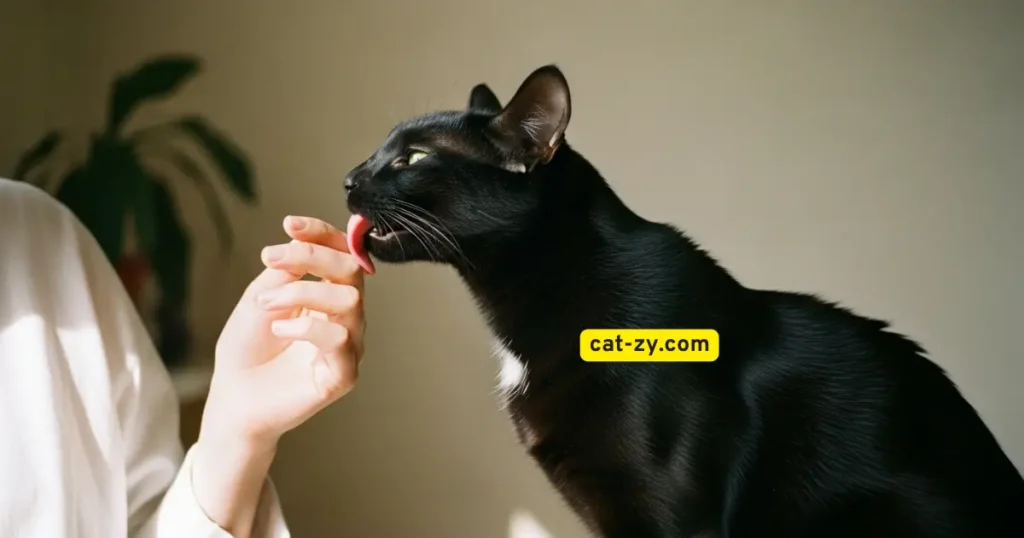
Gentle vs. Rough Licking: What’s the Difference?
Your cat’s licking can be soft and gentle or rough and intense. Gentle licking usually shows love and comfort. On the other hand, rough licking might mean they’re excited, anxious, or need your attention.
Body Language Cues That Accompany Licking
When your cat licks you, they often shows certain body language signs. A relaxed cat might lick you with a loose posture. But an anxious cat might lick fast and look tense.
Licking Patterns and What They Mean
The way your cat licks can also tell you how they’re feeling. Some cats lick in a steady rhythm, showing they’re happy. Others might lick in a way that suggests they’re stressed or anxious.
Common Licking Locations and Their Significance
Where your cat licks you can also be important. For example, licking your hand might mean they love you. But licking your face or hair could be their way of grooming you or marking you with their scent.
By noticing these details, you can better understand your cat’s communication. This can help you connect with them even more.
When Cat Licking Becomes Problematic
Licking is a normal behavior for cats. But, too much or odd licking might mean there’s a problem. As a cat owner, knowing when licking is not normal is key to keeping your cat healthy.
Excessive Licking: Possible Causes
There are many reasons why cats might lick too much. Anxiety, stress, or health issues are common causes. Cats might also lick a lot if they’re bored or not getting enough to do. Finding out why is important to fix the problem.
Health Issues That May Trigger Abnormal Licking
Some health problems, like skin allergies, fleas, or neurological disorders, can make cats lick too much. In some cases, this licking is a sign of a serious health issue that needs to be checked.
When to Consult a Veterinarian
If your cat’s licking seems too much or odd, it’s time to see a vet. A vet can figure out why and suggest how to help.
Behavioral Therapy Options for Compulsive Licking
If your cat has compulsive licking, behavioral therapy can help. This might include changing their environment, reducing stress, or finding new things to do. A vet or animal behaviorist can help find the best way to help your cat.
How to Respond to Your Cat’s Licking Behavior
Your cat’s licking can change how you interact and their mood. They lick for love, to mark, or to get attention. Knowing why they lick is key to responding correctly.
Appropriate Reactions to Encourage or Discourage Licking
If your cat licks you out of love, pet them gently or talk softly. But if it’s too much or due to stress, stop it by giving them a toy. Consistency is key in teaching your cat what’s okay.
Setting Healthy Boundaries with Your Cat
Setting limits is important for a good cat-human relationship. If licking gets too much, calmly pull your hand back or step away. Maintaining a regular daily schedule allows your cat to anticipate what comes next.
Alternative Ways to Bond with Your Feline Friend
Licking is one way to bond, but there are others. Play, give treats, or just hang out together. Engaging playthings and a stimulating environment maintain your cat’s activity levels and contentment.
Training Techniques for Redirecting Licking Behavior
Teach your cat to lick less with positive rewards. Give treats or praise when they play with toys instead. Patience and consistency are needed, as changing habits takes time.
Conclusion: Appreciating Your Cat’s Unique Way of Showing Love
Learning “why do cats lick you” can make us appreciate their special ways of showing love. By understanding their licking behavior, we can grow closer to our cats. This strengthens our bond and makes our pet bonding experience better.
Cats show love in many ways, like licking. It can mean they love us, mark their territory, or calm themselves. Knowing these behaviors helps us understand our cat’s feelings and needs.
When we notice and respond to our cat’s licking, we build a deeper connection. Whether it’s a soft lick or a thorough grooming, our cat is trying to tell us something. It’s their special way of communicating.
By embracing this special bond, we can make our cat’s life better. We create a loving space for them. This leads to a more fulfilling and rewarding relationship with our pets.
FAQ
Why do cats lick their human companions?
Cats lick people for many reasons. They show love, mark their territory, and groom. They also seek attention, taste new things, and relieve stress. Sometimes, they act like a mom.
What does it mean when a cat licks you gently?
Gentle licking means your cat loves you. It’s a way for them to bond and feel close. It’s comforting for both of you.
How do I know if my cat is licking me due to anxiety or stress?
If your cat licks too much or in a loop, it might be stressed. Look for other signs like pacing or hiding. These can show if they’re anxious.
Is it possible to promote or reduce my cat’s licking behavior?
Yes, you can change how your cat licks. Pet them gently when they lick you to show you like it. To stop, distract them with a toy or game.
Is it normal for cats to lick their owners’ skin, and are there any health concerns?
It’s normal for cats to lick their owners. But watch for health issues if they lick too much. If you have open wounds, stop them from licking to avoid infection.
How can I differentiate between affectionate licks and other types of licking?
Affectionate licks are soft and come with relaxed body language. Anxious or exploratory licks are faster and with tense body language.
What are some alternative ways to bond with my cat if they don’t like being licked or don’t lick me?
You can bond with your cat through play, petting, or quiet time. Some cats like watching birds or playing with toys. Try different things to see what they like.


